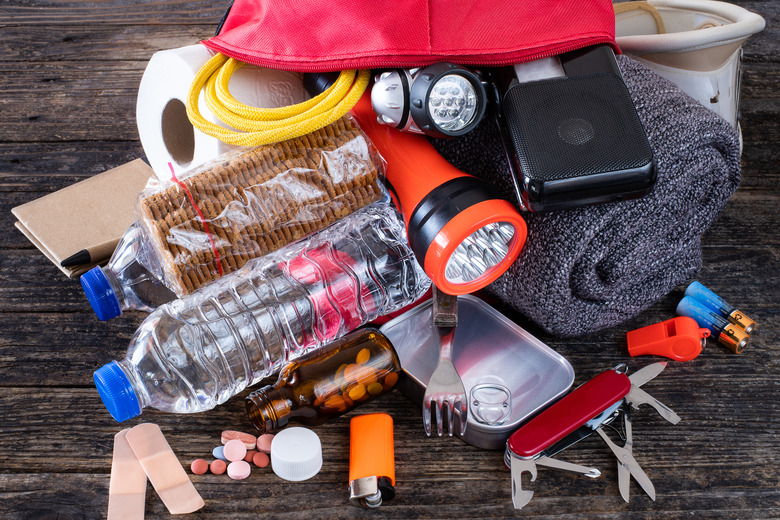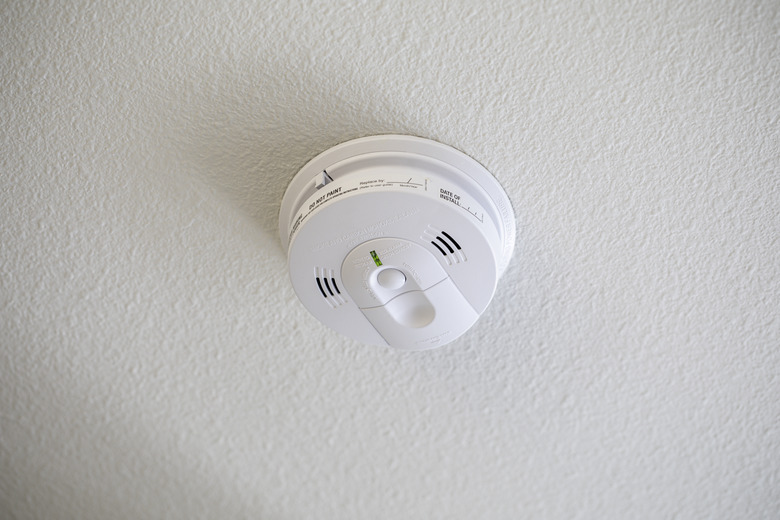How To Prepare Your Home For Emergencies — A Checklist
We may receive a commission on purchases made from links.
Developing an emergency preparedness plan for your family involves assembling the proper supplies and developing and practicing an evacuation plan. Think about the different types of emergencies that could affect your home and make sure you have a plan specific to each scenario.
Creating an Emergency Preparedness Kit
Creating an Emergency Preparedness Kit
You need to prepare at least two emergency kits. One should be kept in your car so that you can immediately leave the house, get in the car and drive to safety. The other should be kept in a central location in your home so you can have it on hand during a power outage or grab it on your way to your tornado safety area. Here's a small sampling of what to include:
- Written list of important phone numbers, addresses and other emergency contact information
- Copies of Social Security cards, insurance cards and any other important documents
- Phone charger
- Flashlight
- Radio
- Extra batteries
- First-aid kit
- Extra leashes, pet food and a collapsible water bowl
- An emergency supply of medications
- Extra diapers, bottles, formula, diaper rash cream and other baby supplies
- At least one change of clothes for all family members
- Nonperishable food to last at least three days
- 3 gallons of water per family member (lasts three days)
- Mess kits, utensils and can opener
- One sleeping bag per person
- Wet wipes, garbage bags, twist ties, feminine hygiene products and hand sanitizer
- Pencil and paper
- Age-appropriate puzzles or toys to keep kids entertained
Know When and Where to Go
Know When and Where to Go
Part of your disaster preparedness plan should involve deciding when to evacuate. If you wait too long to leave before a hurricane, for example, you may get stuck in traffic and struggle to leave the area. If you wait too long to leave in the event of a flood or a wildfire, you might expose yourself and your family to extra danger.
Sign up to receive emergency alerts through the government, the American Red Cross or your local news station. Regardless of any official recommendations, it's up to you to determine what kind of forecast or event warrants immediate evacuation from your home.
You also need to decide where to go. Your plan will differ from disaster to disaster. For example, you could stay with a neighbor in the event of a house fire, but you might need to visit your parents' home 300 miles away in the event of a flood. Don't assume you'll be able to book a room at a hotel since they'll fill up quickly if many people are affected by the emergency. Most communities set up emergency housing to help people at low or no cost. Determine where this information is distributed before disaster strikes so that you'll know whom to call or where to go. Decide ahead of time where everyone will meet if you get separated.
Special Winter Considerations
Special Winter Considerations
If you live in an area that experiences freezing temperatures during winter (and even if you don't), it's vital to pack a bag for such conditions. Keep blankets, mittens, gloves, scarves, hats, socks and winter jackets in your car during the winter just in case you get stranded on the road and have to turn off your car and its heater to conserve fuel. A shovel, windshield scraper and bag of sand or cat litter can also help you dig out of snow or ice and get moving again.
You can also end up stranded in your own home during blizzards. If your power goes out, do you have an alternative way to heat your home? Gasoline-powered generators pose a danger in this situation because they cannot be used in enclosed spaces; you could die from carbon monoxide poisoning. Instead, one of the best things you can do is purchase a natural gas space heater or wall heater that can heat a small area of your home. Natural gas utility lines are always buried, whereas electrical utility lines often run above ground. As a result, electric power outages are far more common during winter weather than gas outages.
Special Fire Considerations
Special Fire Considerations
Some documents and mementos are very difficult to replace. Store all of your essential original copies in a fireproof box. If you also have valuables or prefer to keep cash on hand, invest in a fireproof safe as well. You'll also need to make sure you can escape through multiple routes, including upper-story windows. Invest in fire-escape ladders for every second-story or third-story room in your home. Replace any deadbolt locks on your doors that require a key to open from the inside, as these make it extra difficult to evacuate in a timely manner during a fire.
Preparing Family Members for an Emergency
Preparing Family Members for an Emergency
Once you have an emergency plan, it's important to share it with your loved ones to get everyone on the same page. Moving quickly during an emergency situation could mean the difference between life and death. The best way to keep your family safe is to practice, especially with kids and pets. Younger kids may need it to be more of a game than a fear-inducing exercise. Give everyone a job so each person knows what to grab (if anything) and where to go. Explain that each emergency requires a different plan. For example, you can practice following fire escape routes and crawling on the floor to get under the smoke during a fire drill or heading straight to the basement or designated safe room during a tornado drill.
Preparing Pets for an Emergency
Preparing Pets for an Emergency
Pets can also get scared in an emergency, so it's important to practice randomly grabbing them and hurrying out of the house, loading up in the car or squishing into the designated tornado room. For example, you'll need to practice placing a cat in its carrier and turning it into a good experience instead of a drawn-out struggle so you can load up and evacuate at a moment's notice. If you have three dogs and a small bathroom is the safest place for everyone during a tornado, practice hustling them all into that room. You may not have time to leash them and muscle them in during an emergency. Consider getting each pet microchipped to facilitate a safe reunion in the event that you get separated.
Safe Habits to Practice
Safe Habits to Practice
In addition to practicing your emergency evacuation plans, start getting into other safe habits. For example, don't let your car get low on gasoline. You never know when you'll need to evacuate by car, and you don't want to be delayed by a lack of gas. In the event of a wildfire or other extreme weather event, getting gas isn't a quick stop because everyone else will be flocking to the gas station too.
If you're driving in winter, always tell someone where you're going, what route you're taking and when you plan to arrive. Then, check in with that person once you get there safely. This way, if your car slips on ice, gets snowbound or simply refuses to carry on in the cold weather, your friend can tell rescuers where to look, even if you're driving on back country roads.
Make sure you keep your home's smoke detectors equipped with fresh batteries. Finally, learn how to turn off all utilities leading to your home. If you have time to do so, turn these off at the main shutoff valves before evacuating during a natural disaster.


